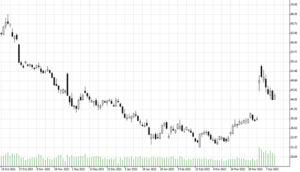

14.04.2022 – So it’s true: Elon Musk wants to buy Twitter. It is quite possible that Musk will have to deliver a second helping. But if the hostile takeover attempt fails, the bears can rejoice. That is certainly possible. Because Twitter is not just any company. It is an important opinion channel for the woke cultural chic in the USA. That’s why the resistance of the good, better and best people in the American power structure is likely to be enormous.
The richest man in the world is offering $54.20 per share for Twitter, or just under 50 euros. He says the company has extraordinary potential, which he will leverage. Musk’s offer is 54 percent higher than the price at the end of January. Congratulations to all traders who had the right nose. Twitter is now worth around 43 billion dollars. Musk can afford it: his assets amount to 260 billion dollars, and he has around 80 million followers on Twitter. In the daily chart, you can see that traders have already taken profits. And that the current offer is probably not enough for the stock market – the price was already higher when the 9 percent share was announced on April 4. If Musk follows suit, it will go north again. If not, the gap will be closed.

Source: Bernstein Bank GmbH
And that brings us to the opportunities for the bears. Twitter is not just any company. It is the mouthpiece of the left-wing cultural chic, which would probably lose an important opinion channel with Musk’s purchase. For example, Twitter has problems with former President Donald Trump’s freedom of expression. However, Twitter turns a blind eye to tweets from Islamists or Antifa, the Republican opposition criticizes. This is precisely why Trump launched his own social media channel; and also because of the annoying political one-sidedness, Twitter’s share price had plummeted sharply in recent months.
Musk is too independent
At Twitter, the East and West Coast establishment is likely to raise heaven and hell to stop Musk. Because he’s simply too independent – and unabashedly represents right-wing positions. For example, after Tesla’s plants were closed as a result of the lockdown, he discussed special arrangements with authorities. He also disapproved of the interim curfews in the People’s Republic of California. Specifically, “To say they can’t leave their house and they will be arrested if they do is fascist. That is not democratic, that is not freedom.” Outrageous.
Salute to Sleepy Joe
Musk also has a problem with Joe Biden. For example, the entrepreneur does not like the planned billionaire tax at all. In addition, Musk was annoyed that the U.S. president did not formulate any congratulations to Musk’s space company SpaceX after it made the first space flight with a purely civilian crew. Elon Musk’s comment, “He’s still asleep.” With which he took up the ball from Trump, who had repeatedly referred to Biden as “Sleepy Joe” during the election campaign. He also served on Trump’s economic council. Musk himself has described himself as “half Democrat, half Republican.” He is independent and “politically moderate,” he announced on Twitter in 2018. Very unusual for an entrepreneur from the eco-correct e-industry.
Threat of class action lawsuit
Twitter’s own management is also likely to be spectral of Musk, who announced plans to turn the San Francisco headquarters into an asylum for the homeless. Where will the millionaires have to move to then? In addition, the Dems want to strengthen the power of the unions – Musk wants nothing to do with that. Moreover, Musk is in legal trouble. According to a class action lawsuit filed Tuesday in a federal court in New York, Musk already reached a Twitter shareholding of five percent on March 14, which required him to make his holdings public by March 24. However, this did not happen until April 4. During that period, Musk had further increased his stake to more than 9 percent.
The conclusion from all this: It is quite possible that Musk will drop Twitter again as soon as it becomes too colorful for him. Presumably hedged with put options, he could back out of the deal. This would send the share price plummeting south. So keep an eye on the real-time news – the drama could be prolonged by several acts. Whether long or short – Bernstein Bank wishes good luck!
Important Notes on This Publication:
The content of this publication is for general information purposes only. In this context, it is neither an individual investment recommendation or advice nor an offer to purchase or sell securities or other financial products. The content in question and all the information contained therein do not in any way replace individual investor- or investment-oriented advice. No reliable forecast or indication for the future is possible with respect to any presentation or information on the present or past performance of the relevant underlying assets. All information and data presented in this publication are based on reliable sources. However, Bernstein Bank does not guarantee that the information and data contained in this publication is up-to-date, correct and complete. Securities traded on the financial markets are subject to price fluctuations. A contract for difference (CFD) is also a financial instrument with leverage effect. Against this backdrop, CFD trading involves a high risk up to the point of total loss and may not be suitable for all investors. Therefore, make sure that you have fully understood all the correlating risks. If necessary, ask for independent advice. CFDs are complex instruments and are associated with the high risk of losing money quickly because of the leverage effect. 68% of retail investor accounts lose money trading CFD with this provider. You should consider whether you understand how CFD work and whether you can afford to take the high risk of losing your money.7
